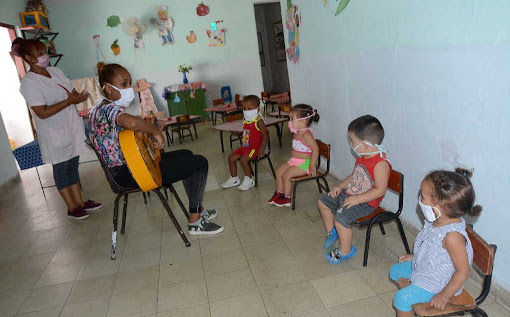Thousands of mothers in Cuba see their professional development hindered by a lack of places in childcare centers. This is the predicament faced by Yanís Tudela, a resident of Old Havana who has a degree in Accounting and Finance.
Tudela does not work because she has no one to care for her one-year-old son. The young mother recently applied for a place at a daycare center, but did not get a spot.
In Cuba, the main requirement to get a slot in a daycare center is that the mother, father or guardian of the child be a worker. To access this service, one must submit a letter from a workplace, and then present a similar document every three months.
Tudela had a job, but, unaware that she was pregnant, she changed to a temporary contract with a new company. As soon as she discovered her state, she informed management... and they cancelled her contract to avoid covering her maternity leave.
The result is an unemployed mother who has no one to care for her child, struggling to get a new job. "It's a catch-22: if I have to take care of my child, I can't work, and if I can't work, I can't get a place in at a daycare center," she says, dejected.
In a similar situation is Ariadna, a resident of the capital city Cerro, who had to pay a babysitter 20 CUC to deal with this situation. "I got a job as an accountant that will allow me to pay for the care and still have something to contribute to household expenses. I have to do it, because it's just me and my husband."
Ariadne is pessimistic about getting a spot at a childcare center. "My mother always worked in a library, and neither my 37-year-old brother, or I, now 28, went to one because we never had a slot. My mom tells us that more than once she put my brother in a drawer… while she was doing her job."
Yanis Tudela also tried to put her son in a private center, but even this option, though much more expensive, is not always possible. "In the nearby centers there is no space for my son, and in the ones further away, it doesn’t make any sense, given how bad the transportation is," she explains.
With the Covid-19 pandemic, the number of children authorized for each caregiver or private center was slashed by 50%. This measure was not applied to state facilities, but they still cannot cover the demand.
Official media reported months ago that, of 1,085 daycare centers across the country (Ecured sets the figure at 1,130), more than 900 were open during the lockdown, mainly to provide services to those mothers working in high-priority sectors.
Tudela, however, is in the group of mothers who are not a priority for the Cuban state. Now she has decided to get a freelancing license so that she can apply for a slot at the daycare center.
"I prefer to pay for a license as a 'document interpreter', based on my language skills, so that I can get childcare and not depend exclusively on my husband," she says.
In addition to the fee, which will depend on a formula applied to her salary and the number of children she has enrolled, she must add the cost of her license. That will be the real price of the childcare.
As part of its fight against its aging population, the Cuban state encourages childbirth through "guarantees for the whole family." To this end, the Council of State issued Decrees 339 and 340, which cover guaranteed wages, multiple employment and general protection for working mothers under special regimes.
Although resolution 6/2017 governs the granting of slots at childcare centers, none of these legal instruments guarantees mothers, fathers or guardians anything.
A report from the official newspaper Granma entitled "How will childcare centers resume the school year?", published on October 29, mentioned that Maria de los Angeles Gallo, national director of Early Childhood at the Ministry of Education, stated in a live broadcast via UNICEF’s Facebook page that the centers serve 19% of the nation's children.
According to data provided by the official, among the guaranteed places in childcare centers, the "Educate Your Child" program (which includes more than 68% of children under five) and preschool (12%), account for 99% of children under six years of age nationwide with some type of care. However, the official contradicted herself by acknowledging that there are more than 30,000 mothers requesting childcare, and it is impossible to meet this level of demand.
The regime’s newspaper Sierra Maestra reported that between 2019 and 2020 there were 5,218 applications in Santiago de Cuba for slots at daycare centers, with only 2,321 getting them, representing 44.4% of the total. Extrapolating this data to the whole country, one can get an approximate idea of the shortfall.
The weakest link in the social chain is Cuban mothers, who are affected by a macho culture, a shortage of childcare centers, and insufficient legislative protection. In this harsh context, many manage to prevail, while others remain under their husbands’ economic and psychological yokes.
